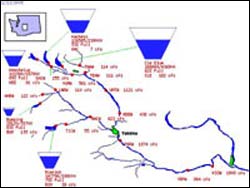Business as usual threatens future of fish – Scientists call on managers to incorporate new scientific understanding into fishery plans
In a scientific double whammy, researchers report that fishing pressure is causing fish to evolve to smaller sizes, just as new studies show that larger fish are critical to sustaining populations. In species such as Pacific rockfish, the big, old females not only produce exponentially more eggs than younger, smaller females, but their hearty larv
Steve Palumbi is no stranger to controversy. A marine biologist at Stanford University, Palumbi incurred the wrath of the Japanese whaling industry more than a decade ago by conducting the first genetic study of whale meat sold in Tokyo food markets.
Japan harvests more than 300 Antarctic minke whales every year for scientific research. The Japanese government, arguing that minke whales are relatively abundant, allows the slaughtered giants to be sold as food.
In the earl
Volcanic eruptions in Siberia 251 million years ago may have started a cascade of events leading to high hydrogen sulfide levels in the oceans and atmosphere and precipitating the largest mass extinction in Earth’s history, according to a Penn State geoscientist.
“The recent dating of the Siberian trap volcanoes to be contemporaneous with the end-Permian extinction suggests that they were the trigger for the environmental events that caused the extinctions,” says Dr. Lee R.
Typical economic analysis applied to global warming may be biased because they neglect climate thresholds, according to Penn State researchers.
“Economic models of climate change typically assume that changes occur gradually and reversibly,” says Dr. Klaus Keller, assistant professor of geoscience, Penn State. “However, some environmental effects are not smooth and show a threshold response. For a long time nothing or very little happens and then suddenly a large change occurs.”
Surrounded by winter snow and ice, melting seems like a good thing, but, on a global scale, the melting of ice sheets and glaciers is a sign of global warming, according to a Penn State glaciologist.
“The really big picture shows change in the ice and those changes look like what we get is a world that is a little warmer,” says Dr. Richard B. Alley, the Evan Pugh Professor of Geosciences. “We currently do not include all these processes in the models that predict the global future.

El Niño’s effects on a Pacific Northwest river valley offer forecasters a window to dry years ahead
Global warming conversations have shifted from whether climate is changing to how we will deal with the inevitable consequences. And the price you pay will depend on where you live and how well you prepare, suggests one of the most detailed studies to date on global warming and its likely effect on human activity.
“Like politics, global climate change is local,” said